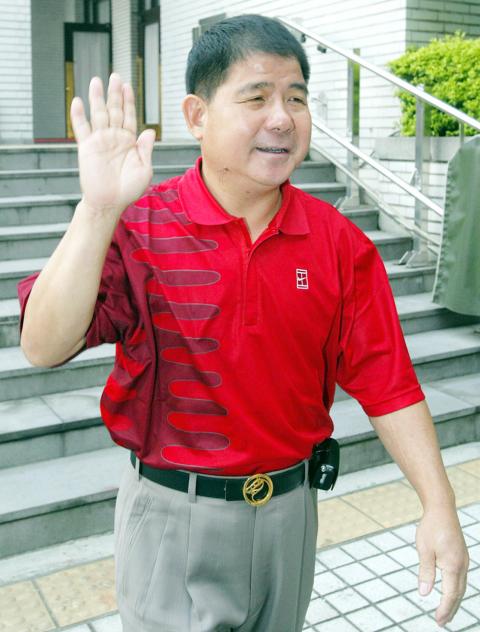Former Democratic Progressive Party (DPP) legislator Chu Hsing-yu (朱星羽) was found dead in a motel bathroom in Greater Kaohsiung yesterday.
Chu’s body was found at about 8am yesterday. The initial cause of death has been determined as a heart attack, although a bottle of Kaoliang liquor and sleeping pills were found in his room, police said.
Long considered one of the party’s most representative grassroots figures, Chu represented the DPP in Greater Kaohsiung for more than 10 years and was known for his poignant manner of directing questions at the Legislative Yuan.

Photo: CNA
He was also known for his boisterous behavior at the legislature.
Chu found himself in hot water over a fistfight with DPP member Lin Chung-mo (林重謨) in November 2003. Chu flew into a rage after Lin said that legislators were selfish and shameless.
The fight followed another scene at the legislature in which Chu threw his chair at the podium to protest the postponement of legislative confirmation of a trade agreement with Panama.
The incidents prompted the DPP to seek disciplinary action against Chu.
He declared he was leaving the party in 2003, after the party caucus blocked a motion that he had spearheaded. After leaving the DPP, Chu joined the Non-Partisan Solidarity Union, but did not bid for a legislative seat and chose to leave politics.

MAKING WAVES: China’s maritime militia could become a nontraditional threat in war, clogging up shipping lanes to prevent US or Japanese intervention, a report said About 1,900 Chinese ships flying flags of convenience and fishing vessels that participated in China’s military exercises around Taiwan last month and in January have been listed for monitoring, Coast Guard Administration (CGA) Deputy Director-General Hsieh Ching-chin (謝慶欽) said yesterday. Following amendments to the Commercial Port Act (商港法) and the Law of Ships (船舶法) last month, the CGA can designate possible berthing areas or deny ports of call for vessels suspected of loitering around areas where undersea cables can be accessed, Oceans Affairs Council Minister Kuan Bi-ling (管碧玲) said. The list of suspected ships, originally 300, had risen to about 1,900 as

DAREDEVIL: Honnold said it had always been a dream of his to climb Taipei 101, while a Netflix producer said the skyscraper was ‘a real icon of this country’ US climber Alex Honnold yesterday took on Taiwan’s tallest building, becoming the first person to scale Taipei 101 without a rope, harness or safety net. Hundreds of spectators gathered at the base of the 101-story skyscraper to watch Honnold, 40, embark on his daredevil feat, which was also broadcast live on Netflix. Dressed in a red T-shirt and yellow custom-made climbing shoes, Honnold swiftly moved up the southeast face of the glass and steel building. At one point, he stepped onto a platform midway up to wave down at fans and onlookers who were taking photos. People watching from inside

Japan’s strategic alliance with the US would collapse if Tokyo were to turn away from a conflict in Taiwan, Japanese Prime Minister Sanae Takaichi said yesterday, but distanced herself from previous comments that suggested a possible military response in such an event. Takaichi expressed her latest views on a nationally broadcast TV program late on Monday, where an opposition party leader criticized her for igniting tensions with China with the earlier remarks. Ties between Japan and China have sunk to the worst level in years after Takaichi said in November that a hypothetical Chinese attack on Taiwan could bring about a Japanese

The WHO ignored early COVID-19 warnings from Taiwan, US Deputy Secretary of Health and Human Services Jim O’Neill said on Friday, as part of justification for Washington withdrawing from the global health body. US Secretary of State Marco Rubio on Thursday said that the US was pulling out of the UN agency, as it failed to fulfill its responsibilities during the COVID-19 pandemic. The WHO “ignored early COVID warnings from Taiwan in 2019 by pretending Taiwan did not exist, O’Neill wrote on X on Friday, Taiwan time. “It ignored rigorous science and promoted lockdowns.” The US will “continue international coordination on infectious